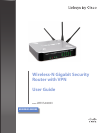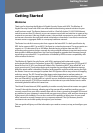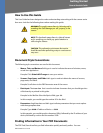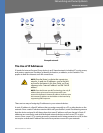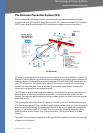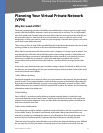
WRVS4400N User Guide 1
Welcome
Getting Started
Getting Started
Welcome
Thank you for choosing the Wireless-N Gigabit Security Router with VPN. The Wireless-N
Gigabit Security Router with VPN is an advanced Internet-sharing network solution for your
small business needs. The Router features a built-in 4-Port full-duplex 10/100/1000 Ethernet
switch to connect four PCs directly, or you can connect more hubs and switches to create as big
a network as you need. Like any wireless router, it lets multiple computers in your office share
an Internet connection through both wired and wireless connections. It can also be used as an
intranet router to aggregate traffic to a company backbone network.
The Router has a built-in access point that supports the latest 802.11n draft specification by
IEEE. It also supports 802.11g and 802.11b clients in a mixed environment. The access point can
support an 11n data rate of up to 300 Mbps. Besides having a higher data rate, 802.11n
technology also promises longer coverage by using multiple antennas to transmit and receive
data streams in different directions. Users are encouraged to upgrade their firmware through
www.linksys.com when 802.11n specification is finalized by IEEE to ensure compatibility with
all the wireless-N devices.
The Wireless-N Gigabit Security Router with VPN is equipped with advanced security
technologies like Intrusion Prevention System (IPS), Stateful Packet Inspection (SPI) Firewall, IP
based Access List (IP ACL), and Network Address Port Translation (NAPT, also called NAT as a
more generic term). These technologies work together by providing self-defensive strategy.
Malicious attack traffic is identified, classified, and stopped in real time while passing through
the Router. Users are encouraged to update their IPS signature file to stay current on stopping
malicious worms. The SPI Firewall provides deep packet inspection to analyze packets in
network layer (IP) and transport layer (TCP, UDP) to block illegal packet transactions. Users can
also use IP based ACL to limit traffic to a specific source, destination and protocol. NAPT allows
users to open specific TCP/UDP port numbers to the Internet to provide limited service while
minimizing harmful traffic at the same time.
The Virtual Private Network (VPN) capability is another security feature that creates encrypted
“tunnels” through the Internet, allowing up to five remote offices and five traveling users to
securely connect into your office network from off-site. Users connecting through a VPN tunnel
are attached to your company's network with secure access to files, e-mail, and your intranet as
if they were in the building. You can also use the VPN capability to allow users on your small
office network to securely connect out to a corporate network. The QoS features provide
consistent voice and video quality throughout your business.
This user guide will give you all the information you need to connect, set up, and configure your
Router.



